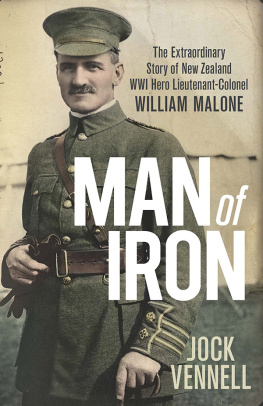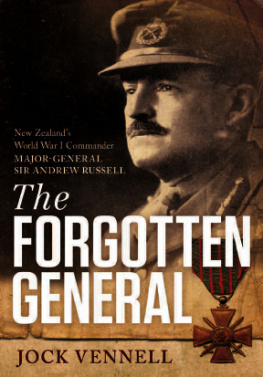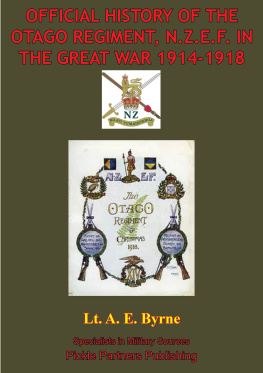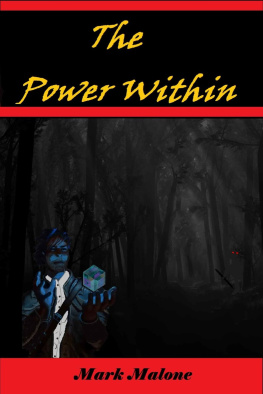
Malone outside his bivouac at Cape Helles, May 1915, where the NZ Infantry Brigade was effectively destroyed as a fighting unit. Malone Family Collection, Wellington, Alexander Turnbull Library
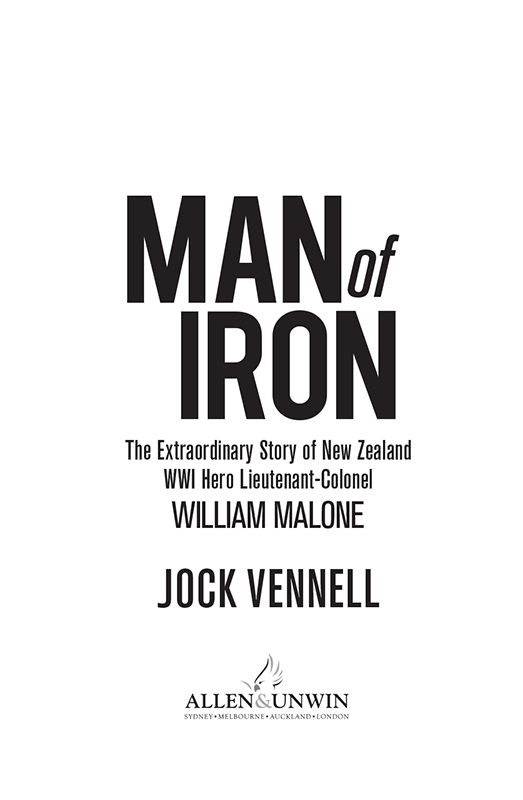
 | The National Army Museum Literary Fund is committed to financially supporting the publication of works of merit on important aspects of New Zealands military and related foreign policy history. The National Army Museum is delighted to present this biography of Lieutenant-Colonel William Malone, one of this countrys best known and finest soldiers from World War I. |
First published in 2015
Copyright Jock Vennell 2015
All rights reserved. No part of this book may be reproduced or transmitted in any form or by any means, electronic or mechanical, including photocopying, recording or by any information storage and retrieval system, without prior permission in writing from the publisher.
Allen & Unwin
Level 3, 228 Queen Street
Auckland 1010, New Zealand
Phone: (64 9) 377 3800
83 Alexander Street
Crows Nest NSW 2065, Australia
Phone: (61 2) 8425 0100
Email:
Web: www.allenandunwin.co.nz
A catalogue record for this book is available
from the National Library of New Zealand
ISBN 978 1 877505 26 3
eISBN 978 1 74343 501 4
Pages 238251 extracted from Voices of Gallipoli by Maurice Shadbolt reproduced with permission of David Ling Publishing, Auckland, New Zealand. The account by Lt Charles Lepper was printed in The Daily News, 24 April 2004.
Maps by Morag Torrington
Index by Puddingburn
Typeset by Post Pre-press Group, Australia
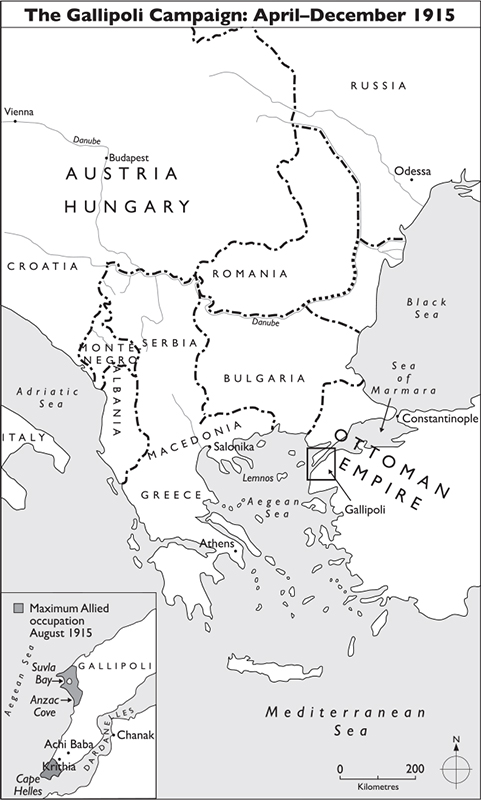
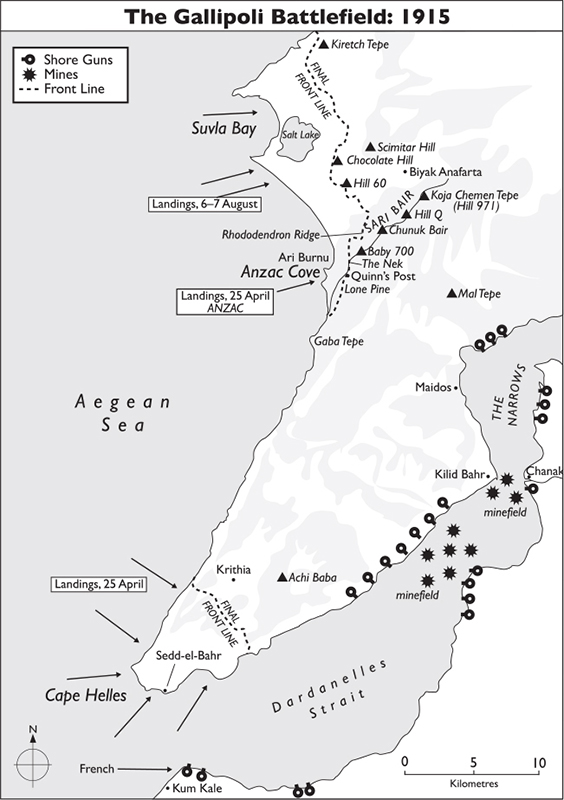
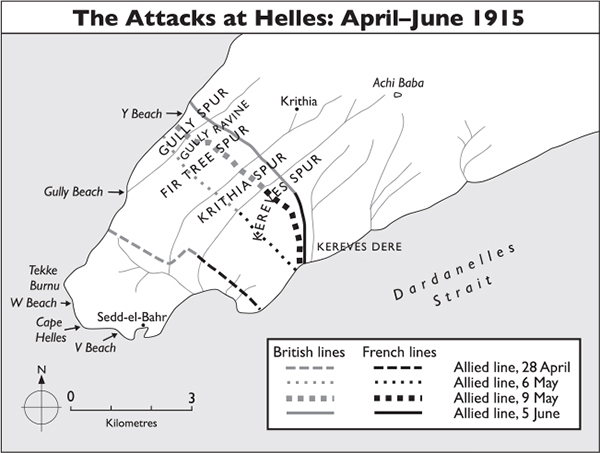
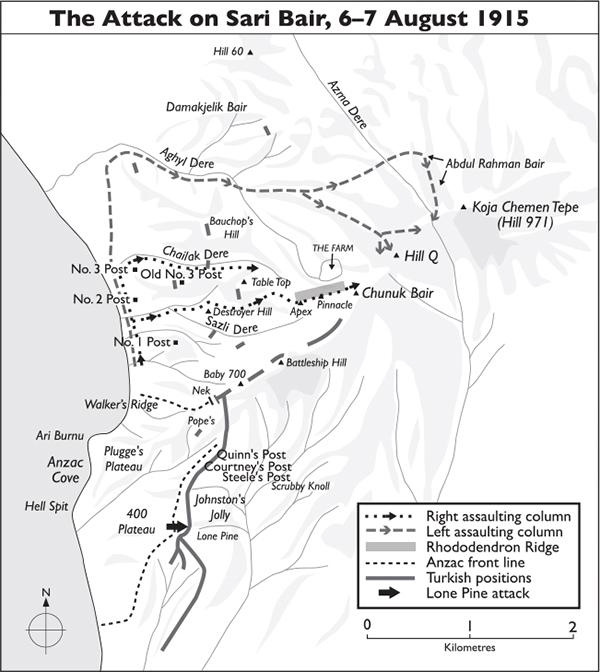
In less than 2 hours, we move off to a valley, where we will be up all night and tomorrow, in readiness for a big attack which will start tomorrow night. Everything promises well and victory should rest with us. God grant it so, and that our casualties will not be too heavy. I expect to go thro all right but, dear wife, if anything untoward happens to me, you must not grieve too much, there are our dear children to be brought up. You know how I love and have loved you, and we have had many years of great happiness together.
I am prepared for death, and hope that God will have forgiven me all my sins. My desire for life, so that I may see and be with you again, could not be greater, but I have only done what every man was bound to do in our countrys need. It has been a great consolation to me that you approved my action. The sacrifice was really yours. May you be consoled and rewarded by our dear Lord...
My candle is all but burnt out and we shall soon be moving. So good night dearest one... Your lover and husband XXX
From the last letters of Lieutenant-Colonel William Malone, written to his wife Ida on the night of 5 August 1915 as the Wellington Battalion prepared for the assault on Chunuk Bair
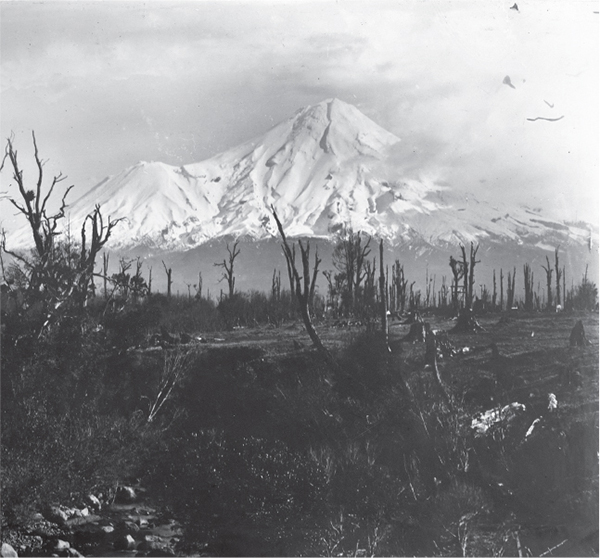
By fire and axe. Malones Taranaki farm looked like this in the early 1880sa wasteland of blackened stumps and ash in which grass seed would be sown and homes built. Puke Ariki, New Plymouth
William George Malone was destined to play many parts in his comparatively short but very active lifepioneering farmer, lawyer, local body administrator, sportsman, family man, aspiring politician and territorial soldier. He was perhaps the best-known New Zealander to serve at Gallipoli, his name forever linked with the epic defence of Chunuk Bair on 8 August 1915.
This biography attempts to place Malone in the context of his timethe conflict with Maori over land in Taranaki, the European settlement of the province in the latter decades of the 19th century, and the clearing of the great rainforests of the interior. It examines his farming, business and military activities and his family relationships in the years leading up to World War I.
Much attention is given to Malones Volunteer Force activities in the years before the war, the training of the Wellington Battalion he rose to command, the landing at Gallipoli, the fighting at Helles and Quinns Post, and the final battle for Chunuk Bair. The most controversial feature of Malones command at Gallipolihis defence of the heights of Chunuk Bair during the Allied attack on 8 August 1915is dealt with in some detail. The biography ends with an assessment of Malone as soldier, personality, husband and family man.
As a first attempt at a biography of Malone, this project was a challenging one as few of his pre-war records have survived. In training in New Zealand and on Gallipoli, however, he was a prolific diarist and letter writer, and it is on these writings, on material provided by the National Library and Archives New Zealand, and on family sources that most of this book is based.
A key starting point was No Better Death: The Great War Diaries and Letters of William G. Malone, edited by Defence Force historian John Crawford. A knowledge of World War I in general and of the Gallipoli campaign in particular were an essential background to the book, as they must be for any historian attempting to understand the campaign and the soldiers and politicians who shaped it.
Malone was not to survive Chunuk Bair. Fighting at the head of his men, he would die by friendly fire 36 hours before Mustapha Kemals Turkish battalions swept the relieving New Army troops off the summit. If there was to be no victory on that hard-assaulted spot, he would have asked for no better death.
Yes we took Chunuk Bair and, unsupported, (just seventy-six surviving of our seven hundred) lost it A British gunner delivered my death, A gateway in Taranaki remembers my name.
The Commanding Officer, C.K. Stead
William George (Willie) Malone was not a native-born New Zealander but an immigrant, as were the majority of settlers in this country in the early 1880s. He was born on 24 January 1859 at Rushey Green, Lewisham, in Kent, the third child of Thomas Augustine Malone and his wife Louisa. Both were staunchly Catholic and between them they produced a family of fivethree brothers, Edmund, Austin and William, and two sisters, Agnes and Louisa (Louie). Edmund died of unknown causes aged 19 before the family left England for New Zealand.
The Malone family was of mixed EnglishIrish extraction. Williams great-grandfather is believed to have been a native of County Westmeath in the midlands of Ireland, where family sources say he may have been employed as a bailiff or steward on the estate of an Irish nobleman of the period.
Williams grandfather and his brothers are thought to have migrated to England in the mid-19th century as a result of the great Irish potato famine that killed an estimated 750,000 of their countrymen and forced another two million to migrate to Britain, Canada and the United States.
Next page
